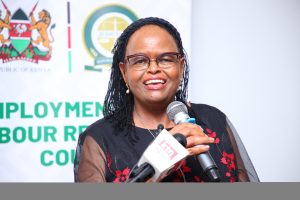Judiciary opposed to merger of ELRC and ELC with High Court – CJ Koome

NAIVASHA, Kenya March 21, 2024 – Chief Justice Martha Koome has written to the leadership of Parliament expressing the Judiciary’s opposition to a proposed constitutional amendment to merge the Employment and Labour Relations Court (ELRC), the Environment and Land Court (ELC) with the High Court.
The Chief Justice contends that there was informed reasoning that prompted Kenyans to demand for specialised courts to handle employment and labour relations, and also environment and land matters.
“The contribution by the two courts to expeditious delivery of justice and a robust jurisprudence in these areas of special concern to Kenyans justify the continued existence of the specialised courts,” CJ Koome told the Annual Conference of Judges of the Employment and Labour Relations Court on Thursday.
According to the Chief Justice, the ELRC registered a Case Clearance Rate of 166 per cent in the first half of the 2023/2024 Financial Year after resolving 3,414 cases.
“However, the challenge of backlog remains a pressing concern. With a considerable number of cases pending beyond a year, our shared goal must be to intensify efforts to reduce this backlog, ensuring timely justice for all parties involved. As at the end of December 2023, the Court had 9,362 pending cases,” she highlighted.
She indicated that out of these pending cases, 7,837 matters have been in court for more than one year, which means they fall within the Judiciary’s definition of case backlog.
The CJ observed that the rate of adjournments reduced from 3 per cent that was recorded the previous financial year, to an adjournment rate of 2 per cent of scheduled cases during the first half of this Financial Year. “This reduction signifies a commitment to expediting the judicial process, further enhancing the court’s efficiency.”
She noted that the court’s jurisprudence has contributed to the social transformation envisioned by the Constitution by addressing contemporary issues at the work place but also setting a benchmark for social justice.
“From upholding the rights of marginalized and vulnerable groups to ensuring workplace safety, the court has made significant contributions that resonate with the social justice aspirations of our Constitution,” she opined.
She singled out landmark judgments in areas such as unfair dismissal, collective bargaining, occupational safety, and the resolution of disputes arising from economic restructuring receiving critical commentary and citation by scholars within and outside Kenya.
She emphasised the need for a collective commitment to upholding the highest standards of judicial conduct, which aligns with the overall aim to make ‘judicial hygiene’ part of Kenya’s judicial culture.
“Our goal has been that we should make ethics and integrity become second nature to our institution. There ought to be no second-guessing or doubts about the integrity of our Judges, Judicial Officers and Staff.”
Speaking at the same event, Florence Bore, Cabinet Secretary for Labour and Social Protection said that the ELRC must defend and promote labour rights in platform work, remote working and in other typical forms of work arrangement. “Our laws need to accommodate all workers without distinction and to ensure that all workers are afforded dignity, security and fair treatment,” she said.
“The types of employment, organization of work and employment relationships are quickly evolving and there is no doubt there is a need to adjust the legal framework for promotion of justice, equity and industrial peace and harmony,” noted CS Bore
CEO Federation of Kenya Employers, Jacqueline Mugo, on her part urged the ELRC to continue leveraging on Alternative Dispute Resolution and insisted that labour disputes be subjected to ADR and Court Annexed Mediation before court intervention. “We believe conciliation always leads to win-win situation,” said Ms Mugo.
Justice Byram Ongaya, Principal Judge of ERLC, highlighted that the Court had taken up full application of the Judiciary digital strategy through e-filing, Case Tracking System and virtual courts across all the court stations.







